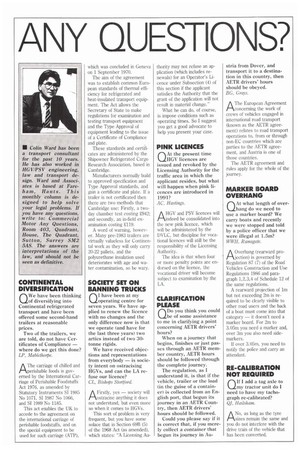CONTINENTAL DIVERSIFICATION
Page 44

If you've noticed an error in this article please click here to report it so we can fix it.
QWe have been thinking of diversifying into Continental refrigerated transport and have been offered some second-hand trailers at reasonable prices.
Two of the trailers, we are told, do not have Certificates of Compliance — where do we get this done? LP„VablethorPe.
AThe carriage of chilled and perishable foods is governed by the International Carriage of Perishable Foodstuffs Act 1976, as amended by Statutory Instruments SI 1985 No 1071, SI 1987 No 1066, and SI 1989 No 1185.
This act enables the UK to accede to the agreement on the international carriage of perishable foodstuffs, and on the special equipment to be used for such carriage (ATP), which was concluded in Geneva on 1 September 1970.
The aim of the agreement was to establish common European standards of thermal efficiency for refrigerated and heat-insulated transport equipment. The Act allows the Secretary of State to make regulations for examination and testing transport equipment and the Type Approval of equipment leading to the issue of a Certificate of Compliance and plate.
These standards and certificates are administered by the Shipowner Refrigerated Cargo Research Association, based in Cambridge.
Manufacturers normally build to approved specification and Type Approval standards, and gain a certificate and plate. If a trailer is not certificated then there are two methods that Cambridge use: Firstly, a twoday chamber test costing 2942; and secondly, an in-field examination costing £119.
A word of warning, however. Many pre-1983 trailers are virtually valueless for Continental work as they will only carry 20-22 pallets, and the polyurethane insulation used deteriorates with age and water contamination, so be wary.




































































































